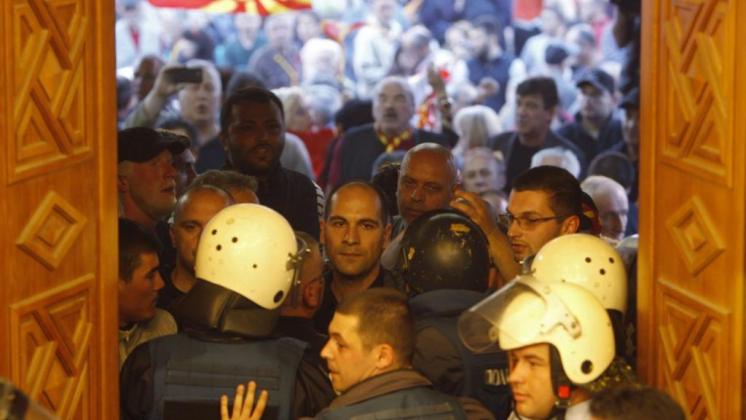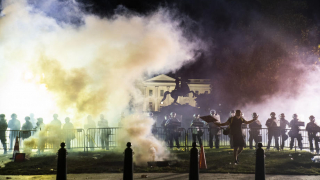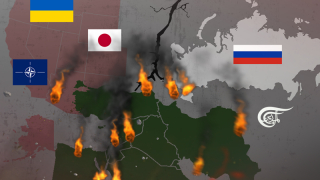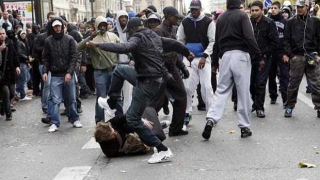Reverse-Color Revolution In The Republic Of Macedonia
The Macedonian parliament saw two dynamic and fast-moving developments take place Thursday evening, the first being a "EuroMaidan"-like coup attempt and the second being the people's successful efforts to reverse this illegal seizure of power and safeguard their sovereignty.
The SDSM "opposition" and its Albanian allies unconstitutionally took brief control of the legislature and declared the ethno-supremacist terrorist Talaf Xhaferi the new "Speaker of the Parliament", but only to have their governmental overthrow attempt offset by the patriotic masses which burst into the building and put an end to the American coup.
Skopje narrowly avoided the Kiev scenario of late-February 2014 due to the diligent reaction of the citizenry, though the country's crisis is still far from over.
As per the author's Law of Hybrid War elaborated upon in an extensive analytical series for Oriental Review, failed Color Revolutions have a recent tendency of rapidly morphing into Unconventional Wars, and there's a very real risk that Albanian separatist-terrorists in the country's mountainous western periphery might stage violent anti-state provocations in response so as to initiate an asymmetrical conflict.
The purpose of destabilizing Macedonia remains the same, and it's to disrupt Russia and China's planned Balkan multipolar megaprojects of the Balkan Stream gas pipeline and Balkan Silk Road high-speed railway, respectively, as well as to weaken the country to the extent that a second large-scale wave of Weapons of Mass Migration can swarm into Europe and throw the continent into chaos.
The situation remains very tense, and what appears to be the first incipient signs of a post-Kosovo region-wide "Greater Albanian" terrorist insurgency hold the fearsome potential of sparking a larger Balkan war if they aren't immediately addressed in multilateral coordination with Macedonia's equally threatened Serbian, Greek, and also Montenegrin partners.
Moreover, any rapid security deterioration in the Republic of Macedonia could create a pretext for a NATO pincer movement from Albania and Bulgaria, both of which harbor unstated but very real territorial designs on their mutual neighbor. Europe hasn't been on the brink of this large of a conflict since the dissolution of Yugoslavia, as the zombified revival of fascist-era "Greater Albania" threatens to drag a multitude of actors into the Hybrid War battlespace.
In addition, regional unrest in the Balkans could provide a trigger for encouraging Salafist terrorists in the failed Federation of Bosnia & Herzegovina to stage their own long-planned attacks in support of their Muslim co-confessionals which might soon start fighting against the government in Macedonia. This in turn could quickly endanger Serbian interests and possibly open up a two-front asymmetrical campaign against Belgrade, too.
Should such an unfortunate chain of events transpire, then the World War II template of Croats, Bosnian Salafists, and Albanians on one hand and Serbs and Macedonians on the other could once more instantly become a present-day reality, complete with the former trilateral axis receiving direct military support from the prevailing European hegemon of the day, in this case the US via NATO (the geopolitical and structural successor/replacement of Nazi Germany).
It's impossible to forecast the exact contours of what may come next, though it can reliably be predicted that the sudden outbreak of warfare in the Balkans would totally undermine the emerging Multipolar World Order, the outcome of which could cynically be said to be the driving motivation behind this Hybrid War campaign all along.
The worst-case scenarios are very difficult to avoid at this point and might even be impossible to postpone, but the only immediate recourse feasibly available right now is for the Macedonian people to continue to remain united behind their constitutional authorities and to assist their law enforcement officers with restoring peace and order in the country, which naturally involves exercising tremendous willpower to avoid being drawn into any street provocations at this highly vulnerable and extra-intense time.
If the government succeeds in restoring and maintaining stability within its borders, then the next logical step would be for it to formally internationalize the conflict resolution process inside of the country beyond the existing (and backstabbing) EU stakeholders by involving Russia as the only trustworthy and reliable actor capable of peacefully mediating the situation in support of international legal principles.
The nearly two-year-long EU-brokered talks between the government and the US-and-Albanian-backed "opposition" have predictably failed to restore stability to the country, and to the contrary, they've only emboldened the Hybrid War agitators -- be they ethno-supremacists or NGOs (oftentimes one and the same) -- thereby discrediting the existing process and creating the impetus for reformatting the dialogue to include Russia's participation.
Seeing as how the Republic of Macedonia has been a zone of New Cold War competition ever since the US made the fateful decision to destabilize the state in late-2014 with Zaev's "bombs" and all of the subsequent aftermath that it wrought into the present day, its only fitting that Russia belatedly be brought to the table to help the government negotiate and sustain a hoped-for peaceful solution to the country's crisis.
Either way, whether Russia is invited to participate in this framework or not, there's no avoiding the fact that the events in the Republic of Macedonia adversely impact in the highest degree possible on Moscow's Balkan interests and consequently its European, and therefore global, strategy, so whether in the near future or sometime thereafter, Russia will inevitably see its diplomatic involvement deepen as it's forced to address this turmoil.
For now, at least, the best thing that Russia can do is to vocally proclaim its full and unconditional political support for the Macedonian authorities and offer them whatever forms of assistance they might request in the forthcoming days, including counter-Hybrid War advisory support from the country's top experts and institutions, whether delivered publicly or clandestinely in accordance with Skopje's preferences.











